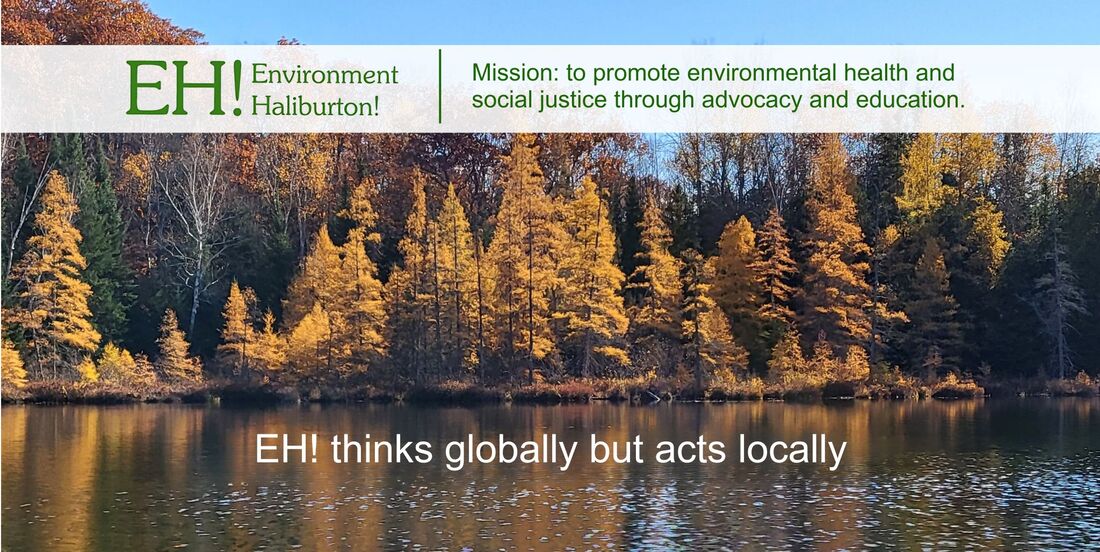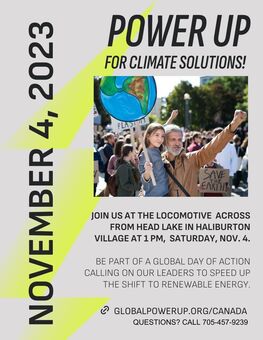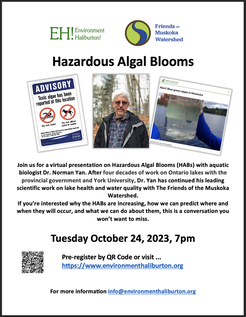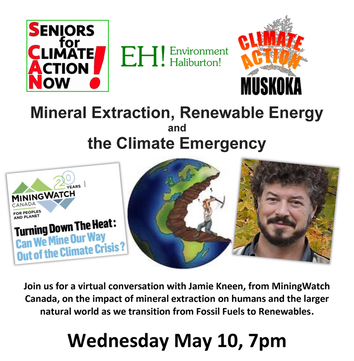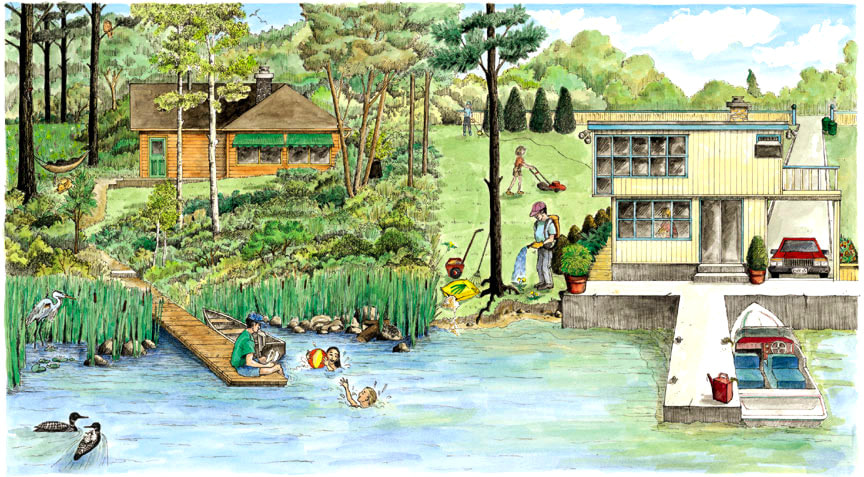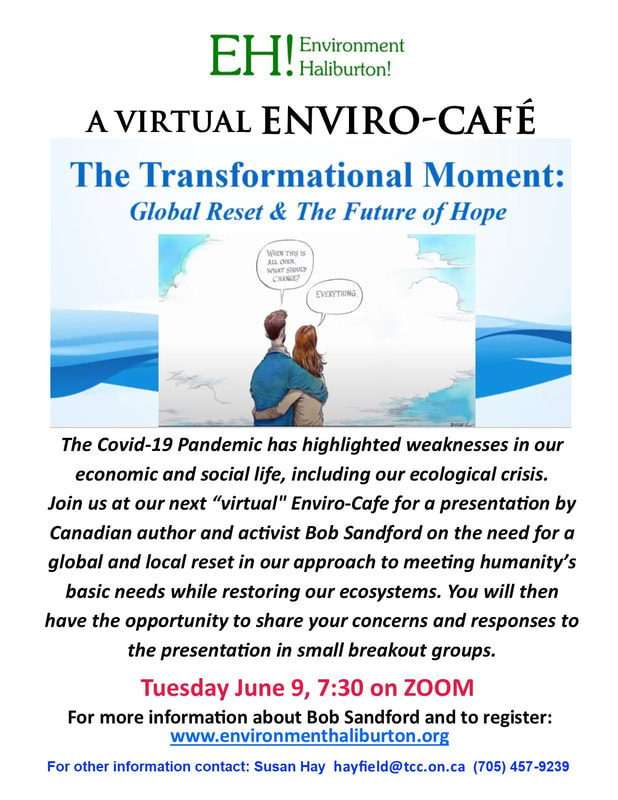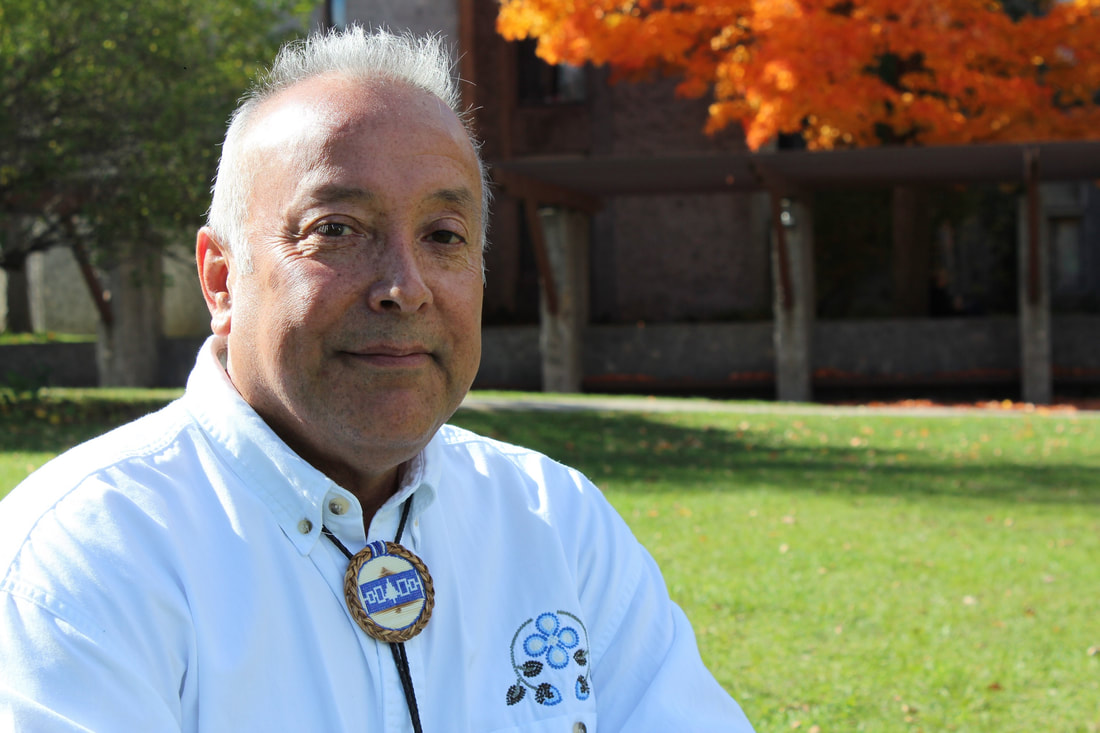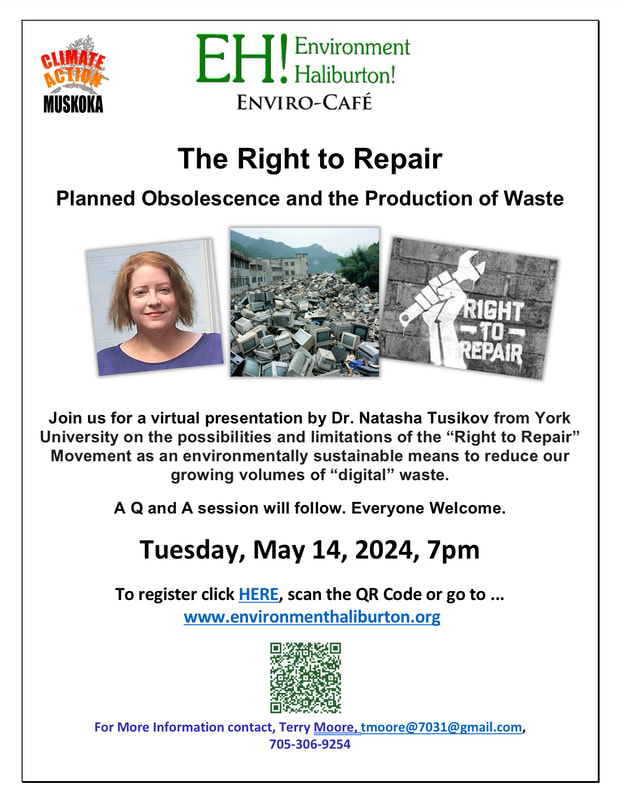
EH! and Climate Action Muskoka will host a virtual presentation featuring Dr Natasha Tusikov, from York University who will speak about The Right to Repair. (please see poster for details) Please register in advance here: https://us02web.zoom.us/meeting/register/tZ0kdO2trjIoGNQpsLlbSZgvufiZM7UK08UY
The Right to Repair: Best Practice or False Hope?
Canada lags behind the United States and Europe in establishing a right to repair for digital goods. It's touted as an economic and social good that can keep jobs in local communities and protect the aftermarket and secondhand goods industries while also reducing waste. But how environmentally sustainable is the right to repair?
Bio: Dr. Tusikov’s research examines the intersection among law, crime, technology, and regulation. She is a senior fellow at the Balsillie School of International Affairs in Waterloo, Canada and a visiting fellow with the Justice and Technoscience Lab (JusTech Lab), School of Regulation and Global Governance (RegNet) at the Australian National University. She is co-author (with Blayne Haggart) of The New Knowledge: Information, Data, and the Remaking of Global Power (Rowman & Littlefield, 2023). She is the author of Chokepoints: Global Private Regulation on the Internet (University of California Press, 2017). She is a co-editor of Information, Technology and Control in a Changing World: Understanding Power Structures in the 21st Century (Palgrave Macmillan, 2019). Dr. Tusikov is also co-editor of Power and Authority in Internet Governance: Return of the State? (Routledge, 2021). Before obtaining her PhD at the Australian National University, she was a strategic criminal intelligence analyst and researcher at the Royal Canadian Mounted Police in Ottawa.
The Right to Repair: Best Practice or False Hope?
Canada lags behind the United States and Europe in establishing a right to repair for digital goods. It's touted as an economic and social good that can keep jobs in local communities and protect the aftermarket and secondhand goods industries while also reducing waste. But how environmentally sustainable is the right to repair?
Bio: Dr. Tusikov’s research examines the intersection among law, crime, technology, and regulation. She is a senior fellow at the Balsillie School of International Affairs in Waterloo, Canada and a visiting fellow with the Justice and Technoscience Lab (JusTech Lab), School of Regulation and Global Governance (RegNet) at the Australian National University. She is co-author (with Blayne Haggart) of The New Knowledge: Information, Data, and the Remaking of Global Power (Rowman & Littlefield, 2023). She is the author of Chokepoints: Global Private Regulation on the Internet (University of California Press, 2017). She is a co-editor of Information, Technology and Control in a Changing World: Understanding Power Structures in the 21st Century (Palgrave Macmillan, 2019). Dr. Tusikov is also co-editor of Power and Authority in Internet Governance: Return of the State? (Routledge, 2021). Before obtaining her PhD at the Australian National University, she was a strategic criminal intelligence analyst and researcher at the Royal Canadian Mounted Police in Ottawa.
Our next virtual Board meeting will be held Wednesday, May 15 at 6:30 pm. Please email [email protected] to request the zoom link for the meeting.
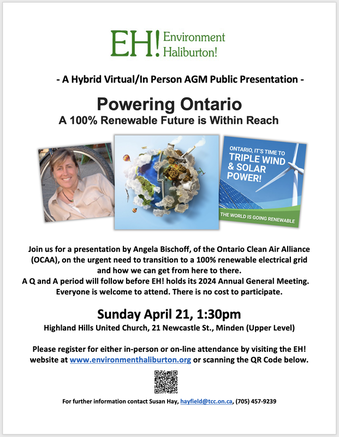
Our AGM speaker was Angela Bischoff. You can view the recording of the AGM at: https://youtu.be/sPx-KZwmFdI?feature=shared
Angela Bischoff has worked with the environmental non-profit sector for more than 3 decades in 4 Canadian cities on issues ranging from eco-cities, transportation, climate, mental health and elections. She is the Director of the Ontario Clean Air Alliance, a small but mighty group aiming to move Ontario onto a 100% renewable path. She also practices and teaches yoga, commutes daily by bike, and cares for her aging mother.
- The Ontario Clean Air Alliance led the successful campaign to phase-out Ontario’s five dirty coal-fired power plants. We are now working to move Ontario towards a 100% renewable future through a combination of energy conservation and efficiency, water power imports from Quebec and Made-in-Ontario green energy.
Angela Bischoff has worked with the environmental non-profit sector for more than 3 decades in 4 Canadian cities on issues ranging from eco-cities, transportation, climate, mental health and elections. She is the Director of the Ontario Clean Air Alliance, a small but mighty group aiming to move Ontario onto a 100% renewable path. She also practices and teaches yoga, commutes daily by bike, and cares for her aging mother.
- The Ontario Clean Air Alliance led the successful campaign to phase-out Ontario’s five dirty coal-fired power plants. We are now working to move Ontario towards a 100% renewable future through a combination of energy conservation and efficiency, water power imports from Quebec and Made-in-Ontario green energy.
GOOD DAY, SUNSHINE! An Introduction to Solar Power for 45th Parallel Homes, Thursday, April 4 at 7pm
Whether you are planning your off-grid dream home or just wanting to reduce your carbon footprint and your energy costs, this webinar is for you.
Audrey Bayens, Registered Energy Advisor, and Arleigh Luckett, a CAM member whose new rooftop solar installation is earning credits on her electricity bill, will provide an overview of how to get started.

What are the links between the housing crisis, energy poverty and climate change ? Learn more about this at our next virtual Enviro-Café on Tuesday, March 12 at 7 pm. This event was recorded and will be available to watch here as soon as it is edited.

On February 13, an organization called Shift will give a virtual presentation about how our pensions are often fuelling the climate crisis. If you missed the presentation, you can watch the recording here:
https://youtu.be/C-G3wPmDpZg
Here are the bios of our impressive speakers for this event:
Adam Scott, Director
Adam is a climate change expert with extensive domestic and international experience in policy, energy and finance, as well as campaign design and execution. At Shift, he works with wide-ranging stakeholders to bring international climate leadership into Canada’s financial sector. Previously, Adam was Senior Advisor to Oil Change International and manager of Environmental Defence Canada’s Climate & Energy program. Adam has advised governments, communicated through national and international media, and published numerous reports focused on various aspects of the low carbon transition. Adam and his family live in Toronto.
Britt Runeckles, BC Pensions Campaigner
Britt is a passionate advocate for climate action and a strong believer in the power of pension funds to play a leading role in the transition to a zero-carbon economy. A graduate of the University of British Columbia, they have experience organizing and campaigning on university divestment and reinvestment campaigns. Based in Vancouver, Britt is responsible for tracking the investments of Western Canada pension funds and building a network of pension beneficiaries who wish to be informed about the risks that climate change poses to their retirement fund. Britt is committed to working with pension funds across Canada to help them deliver retirement security in a zero-carbon future and use their vast resources to invest in climate solutions. They are excited to work with Shift to help beneficiaries make their voices heard and to ensure that their pensions are invested in a way that protects the planet for future generations.
Laura McGrath, Pension Engagement Manager
Laura works with networks of pension beneficiaries who want to understand and communicate to their pension funds the financial risks posed by climate change. Along with her colleagues, she has analyzed the climate strategies of Canada’s ten largest public pension funds, and over the last two years she has tracked the climate commitments and fossil fuel investments of the Ontario Municipal Employees Retirement System (OMERS) and the Healthcare of Ontario Pension Plan (HOOPP). She has supported working and retired municipal professionals, health care professionals and more to engage with their pension funds on the climate crisis.
https://youtu.be/C-G3wPmDpZg
Here are the bios of our impressive speakers for this event:
Adam Scott, Director
Adam is a climate change expert with extensive domestic and international experience in policy, energy and finance, as well as campaign design and execution. At Shift, he works with wide-ranging stakeholders to bring international climate leadership into Canada’s financial sector. Previously, Adam was Senior Advisor to Oil Change International and manager of Environmental Defence Canada’s Climate & Energy program. Adam has advised governments, communicated through national and international media, and published numerous reports focused on various aspects of the low carbon transition. Adam and his family live in Toronto.
Britt Runeckles, BC Pensions Campaigner
Britt is a passionate advocate for climate action and a strong believer in the power of pension funds to play a leading role in the transition to a zero-carbon economy. A graduate of the University of British Columbia, they have experience organizing and campaigning on university divestment and reinvestment campaigns. Based in Vancouver, Britt is responsible for tracking the investments of Western Canada pension funds and building a network of pension beneficiaries who wish to be informed about the risks that climate change poses to their retirement fund. Britt is committed to working with pension funds across Canada to help them deliver retirement security in a zero-carbon future and use their vast resources to invest in climate solutions. They are excited to work with Shift to help beneficiaries make their voices heard and to ensure that their pensions are invested in a way that protects the planet for future generations.
Laura McGrath, Pension Engagement Manager
Laura works with networks of pension beneficiaries who want to understand and communicate to their pension funds the financial risks posed by climate change. Along with her colleagues, she has analyzed the climate strategies of Canada’s ten largest public pension funds, and over the last two years she has tracked the climate commitments and fossil fuel investments of the Ontario Municipal Employees Retirement System (OMERS) and the Healthcare of Ontario Pension Plan (HOOPP). She has supported working and retired municipal professionals, health care professionals and more to engage with their pension funds on the climate crisis.
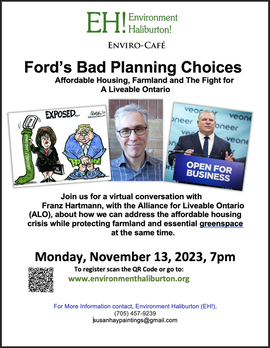
Dr Franz Hartman has been actively engaged in environmental issues for over 33 years, with a focus on public engagement and policy advocacy. In 1998 he earned a PhD in urban environmental policy from York University and started working for City Councillor Jack Layton as his environmental advisor until 2002. From 2003-6, he worked with Jack in Ottawa leading Jack's civil society outreach. From 2007 and 2018 he was the Executive Director of the Toronto Environmental Alliance.
In 2009 Dr Hartman first started working on the Greenbelt. He eventually became Chair of the Ontario Greenbelt Alliance and then its Coordinator in 2020. Since then, Franz has focused on the intersection between housing, the environment, the Greenbelt and urban planning and helped found the Alliance for a Liveable Ontario in early 2022. He is now the Coordinator of ALO.

Since arriving at Nature Canada in 2021, Dr Polanyi has led research and advocacy to advance more transparent and accurate government reporting of logging-related greenhouse gas emissions, and advised on and advocated for the incorporation of nature in Canada’s Adaptation Strategy.
Before joining Nature Canada, Michael coordinated climate engagement and advocacy work at the Toronto Environmental Alliance. Prior to that, he was a social and environmental policy researcher at Queen’s Park, national anti-poverty program coordinator at KAIROS, and a community engagement worker with the Children’s Aid Society of Toronto.
He has led and supported numerous peace, justice, and environmental campaigns, from helping win a student referendum to boycott South African products at McMaster University in the mid-1980s, to securing the City of Toronto’s climate emergency declaration in 2019.
Michael received a doctorate in Environmental Studies from York University in 2000, where he explored the possibilities and limitations of multi-stakeholder change processes.
Before joining Nature Canada, Michael coordinated climate engagement and advocacy work at the Toronto Environmental Alliance. Prior to that, he was a social and environmental policy researcher at Queen’s Park, national anti-poverty program coordinator at KAIROS, and a community engagement worker with the Children’s Aid Society of Toronto.
He has led and supported numerous peace, justice, and environmental campaigns, from helping win a student referendum to boycott South African products at McMaster University in the mid-1980s, to securing the City of Toronto’s climate emergency declaration in 2019.
Michael received a doctorate in Environmental Studies from York University in 2000, where he explored the possibilities and limitations of multi-stakeholder change processes.
To watch the video of this presentation, please click on this link: https://drive.google.com/file/d/18c4fHPgLHZOBF5Hn2Zw4SyyF6nwXxTHY/view?usp=share_link
May Enviro Café |
Resource List
Your browser does not support viewing this document. Click here to download the document.
|
April Enviro Café |
PresentationEH! celebrates Earth Day with special guest Gord Jones, from the Minden area who has 40 years experience as an HVAC technician and teacher of the trade at Mohawk college , to help us to better understand how heat pumps work.
|
March ENVIRO CAFÉ |
Resource List
Allison Hansen from Rodenticide Free Ontario gave a talk about the unintended negative effects of mouse poison on our wildlife and pets. This presentation was not recorded.
The resource list includes a petition to ban rodenticides in Ontario.
Your browser does not support viewing this document. Click here to download the document.
|
EH! SUBMISSION TO Ontario premier doug ford re: bill 23
Your browser does not support viewing this document. Click here to download the document.
February ENVIRO CAFÉ |
presentationMichael Mesure is the Executive Director of Fatal Light Awareness Program Canada (FLAP). A founding member of FLAP Canada, he has been with the organization since it began operations in 1993. An author and speaker, he regularly delivers presentations on bird-building collisions, drawing attention to the reflective light issue that impacts over 1 billion birds over North America annually.
Missed this Enviro Café? https://youtu.be/qSDkj3ygsbE
|
EH! Submission to haliburton county RE: grass lake development
Your browser does not support viewing this document. Click here to download the document.
Environment Haliburton
Annual General Meeting,
Thursday, November 24 at 7 pm.
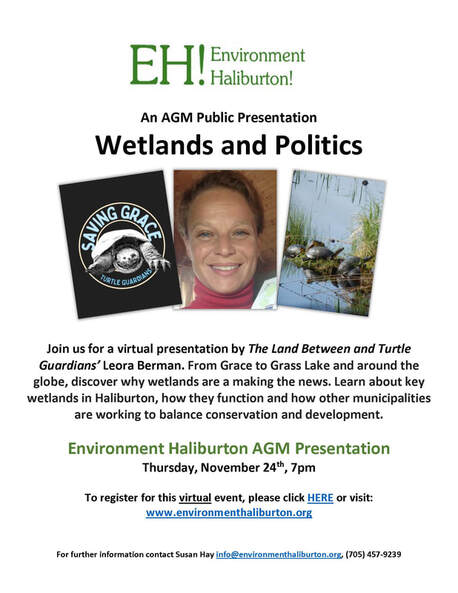
Our speaker was Leora Berman,
Founder and COO of the Land Between and Turtle Guardians.
She spoke about "Wetlands and Politics" and will address the impacts of Bill 23, the "Build more homes faster" Act.
She described her talk as follows: “From Grace to Grass and around the globe, discover why wetlands are a making the news. Learn where the important wetlands are in Haliburton County, how they function and how they are protected in other parts of Ontario. Also learn how other communities are working towards achieving a balance between conservation and development.
Founder and COO of the Land Between and Turtle Guardians.
She spoke about "Wetlands and Politics" and will address the impacts of Bill 23, the "Build more homes faster" Act.
She described her talk as follows: “From Grace to Grass and around the globe, discover why wetlands are a making the news. Learn where the important wetlands are in Haliburton County, how they function and how they are protected in other parts of Ontario. Also learn how other communities are working towards achieving a balance between conservation and development.
|
|
|
resource list
| resource_list_wetlands_and_politics_eh__nov_24_2022.pdf | |
| File Size: | 242 kb |
| File Type: | |
Your browser does not support viewing this document. Click here to download the document.
Environmental Defence Webinar
BAIT and SWITCH
Understanding Bill 23, The 'More Sprawl, Fewer Wetlands' Act
November 7, 12:00-1:00pm
Details here:
https://act.environmentaldefence.ca/page/116310/petition/1
BAIT and SWITCH
Understanding Bill 23, The 'More Sprawl, Fewer Wetlands' Act
November 7, 12:00-1:00pm
Details here:
https://act.environmentaldefence.ca/page/116310/petition/1
|
2022 HALIBURTON COUNTY MUNICIPAL ELECTION SURVEY
FOR MORE THAN 20 YEARS, ENVIRONMENT HALIBURTON! HAS WORKED TO RAISE PUBLIC AWARENESS ABOUT ENVIRONMENTAL AND CLIMATE CHANGE ISSUES ACROSS HALIBURTON COUNTY. ON OCT. 3RD, WE ASKED EACH CANDIDATE 5 KEY QUESTIONS TO GAIN A BETTER SENSE OF THEIR ENVIRONMENTAL UNDERSTANDING AND OPINIONS. RESPONSES APPEARING HERE WERE COLLECTED UNTIL OCT. 14TH, AT 4PM. CANDIDATE RESPONSES HAVE BEEN PUBLISHED, UNEDITED, ON THE ENVIRONMENT HALIBURTON! WEBSITE AND SHARED WITH LOCAL MEDIA OUTLETS. |
CANDIDATE RESPONSES ON KEY ENVIRONMENTAL ISSUES:
Algonquin Highlands Dysart et al Highland East Minden Hills *Click on the name of your Township to view candidate replies* |
The recording of
Ring of Fire Threatens the "Breathing Lands"
May 12, 7:00-8:30pm
Background Documents: scan-climate-crime-9-2022-03-17[1].pdf
Ring of Fire Threatens the "Breathing Lands"
May 12, 7:00-8:30pm
Background Documents: scan-climate-crime-9-2022-03-17[1].pdf
Recent EvEnts
Ford's Bogus Plan
The Climate Emergency and the new Face of Denial with David Robertson of
Seniors for Climate Action Now (SCAN)
The Climate Emergency and the new Face of Denial with David Robertson of
Seniors for Climate Action Now (SCAN)
The Powerpoint slides and script for David's presentation can be downloaded below.
| eh_ppp_david_r_fords_bogus_climate_plan_feb_8_2022.pptx | |
| File Size: | 30760 kb |
| File Type: | pptx |
| ford’s_bogus_climate_plan__dr’s_script_for_ec_presentation_feb_8_2022.docx | |
| File Size: | 36 kb |
| File Type: | docx |
Posing as Canadian
Big Foreign Oil's Capture of
Canada's Energy and Climate Policy
with Gordon Laxer
Big Foreign Oil's Capture of
Canada's Energy and Climate Policy
with Gordon Laxer
Climate Actions that you can take to reduce your ecological footprint:
While individual actions won't fix climate change by themselves, there are things we can do to reduce our impact on our climate and environment.
Composting and reducing food waste are necessary to reduce production methane which happens in landfills, when organic matter decomposes anaerobically.. Composters and biodigesters available at cost at Highlands East and Dysart et al. Please contact municipal offices to arrange pick up.
Traveling: fly less often, consider the carbon footprint of your vacation plans, plan car trips to reduce traveling, check tire pressure, accelerate more gradually, drive at speed limit
Idling is hard on your engine, produces GHGs, pollutants.
Eat a plant based diet, industrial scale livestock production produces enormous amounts of GHGs, consumes vast amounts of water, results in deforestation, water pollution and soil erosion. Buy locally grown produce if possible. Grow a vegetable garden if you have enough sun on your property. Shop wisely, waste less food.
Consume less: buy from thrift stores, reject fast fashion. The fashion industry is very harmful to the environment and is socially unjust. buy quality, donate clothes that are still in good condition. Buy local, buy locally made or grown products, recycle properly, ie clean out containers, check to see what is recyclable and what is garbage.
Conserve heat: weather stripping, insulation, improve windows. Check out Kawartha Haliburton Renovates funding at https://www.kawarthalakes.ca/en/news/2021-kawartha-haliburton-renovates-funding-is-open.aspx
Consider carbon footprint of building materials: https://www.soprema.ca/sustainable-solutions-guide/
Consider installing a heat pump, make sure your furnace or wood stove is running as efficiently as possible, change furnace filters frequently.
Consider installing solar panels: they produce 4 to 5 times the energy it takes to produce them. They have become much more affordable.
Consider buying an electric car, or one that is fuel efficient.
Plant trees for shade, carbon sequestration, flood mitigation, provision of habitat for birds and wildlife.
Conserve trees: intact, mature, natural forests provide better habitat, absorb more CO2.
Protect wetlands: protect turtles; they keep our wetlands healthy. Wetlands purify the water that drains into our lakes, sequester carbon, provide habitat for many endangered species, and mitigate floods. Keep ATVs etc out of wetlands.
Save energy: LED light bulbs, turn off appliances when not in use to avoid “phantom energy”, turn thermostat down at night and when away at work etc.
Wash clothes in cold water, use a clothes line or rack.
Road salt is harmful to plants, aquatic organisms that keep our lakes clean and clear: Reduce use of road salt on walkways, driveways, parking lots by shoveling more often, using eco-friendly salt substitutes.
Gift giving: consider giving an experience rather than “stuff”. Consider the carbon footprint of your gift: eg. the distance it traveled to get to you, eg. roses that come from another continent.
Reject bottled water, drink tap water from reusable containers. Reject plastic packaging whenever possible. Use reusable shopping containers/bags.
Plant native plants in your garden, consider having a smaller lawn. Lawnmowers emit more GHGs than cars. Keep your property as natural as possible (mimic nature) Avoid gas powered leaf blowers.
Consider a low carbon style of recreation: walk/hike/bike/ebike/kayak/canoe/paddleboard
Avoid use of pesticides, wear a bug jacket.
Meet virtually rather than in person if long trips are involved.
Combat eco-anxiety: Join an environmental organization! Become informed, get involved, spend time in nature.
Need to replace your chainsaw? Buy an electric one with rechargeable batteries.
Divest from fossil fuels.
Reject fireworks.
Have an emergency kit ready. The weather will be wilder, wetter and warmer.
Be ready to help your neighbours in case of widespread power outage or storm damage.
Buy a generator if you can afford one. (To use only in case of emergency!)
Recycle your electronics.
The planet thanks you!
COP 26 and Net Zero's Dangerous Distractions
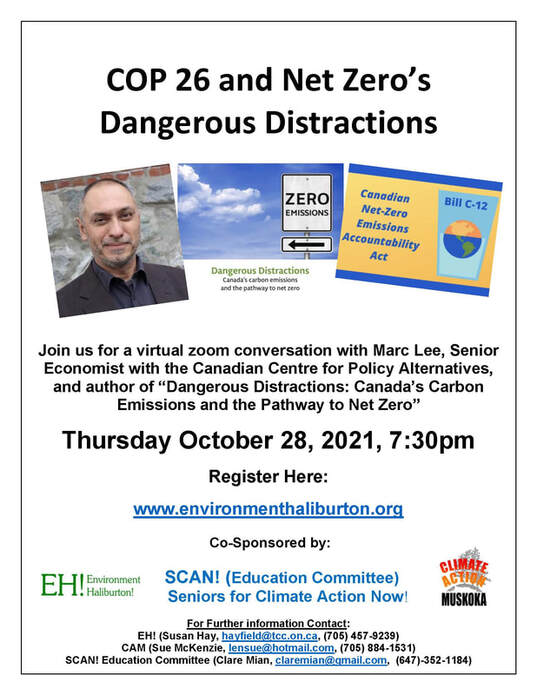
This virtual event was jointly sponsored by Climate Action Muskoka (CAM), Seniors for Climate Action Now! (SCAN!) Education Committee and Environment Haliburton (EH!)
After a brief presentation about COP26 by SCAN members Gail Greer and David Robertson, Marc Lee spoke about the dangers of a Net Zero approach to climate mitigation.
What is COP26? The Glasgow Climate Change Conference, also known as Conference Of the Parties (COP) 26, is the 26th United Nations Climate Change conference. It is scheduled to be held in the city of Glasgow, Scotland, between 31 October and 12 November 2021, under the presidency of the United Kingdom.
Marc Lee is a Senior Economist with the British Columbia office of the Canadian Centre for Policy Alternatives. Marc joined the CCPA in 1998, and is one of Canada's leading progressive commentators on economic and social policy issues. Marc led the CCPA's Climate Justice Project (CJP), which published a wide range of research on fair and effective approaches to climate action through integrating principles of social justice.
Marc continues to write about climate and energy policy, as well as strategies for affordable housing. Over his career, Marc has tracked federal and provincial budgets and economic trends, publishing on a wide range of topics from poverty and inequality to globalization and international trade to public services and regulation.
Marc was "classically trained," with an MA in Economics from Simon Fraser University and a BA in Economics from the University of Western Ontario. But most of the time he argues against the conventional wisdom in economics and policy debates. Marc is the past chair of the Progressive Economics Forum, a national network of heterodox economists, and contributes regularly to Relentlessly Progressive Economics, a blog of the PEF.
This virtual event was jointly sponsored by Climate Action Muskoka (CAM), Seniors for Climate Action Now! (SCAN!) Education Committee and Environment Haliburton (EH!)
After a brief presentation about COP26 by SCAN members Gail Greer and David Robertson, Marc Lee spoke about the dangers of a Net Zero approach to climate mitigation.
What is COP26? The Glasgow Climate Change Conference, also known as Conference Of the Parties (COP) 26, is the 26th United Nations Climate Change conference. It is scheduled to be held in the city of Glasgow, Scotland, between 31 October and 12 November 2021, under the presidency of the United Kingdom.
Marc Lee is a Senior Economist with the British Columbia office of the Canadian Centre for Policy Alternatives. Marc joined the CCPA in 1998, and is one of Canada's leading progressive commentators on economic and social policy issues. Marc led the CCPA's Climate Justice Project (CJP), which published a wide range of research on fair and effective approaches to climate action through integrating principles of social justice.
Marc continues to write about climate and energy policy, as well as strategies for affordable housing. Over his career, Marc has tracked federal and provincial budgets and economic trends, publishing on a wide range of topics from poverty and inequality to globalization and international trade to public services and regulation.
Marc was "classically trained," with an MA in Economics from Simon Fraser University and a BA in Economics from the University of Western Ontario. But most of the time he argues against the conventional wisdom in economics and policy debates. Marc is the past chair of the Progressive Economics Forum, a national network of heterodox economists, and contributes regularly to Relentlessly Progressive Economics, a blog of the PEF.
Recent Videos From Environment Haliburton
EnviroCafés and events
|
|
|
|
|
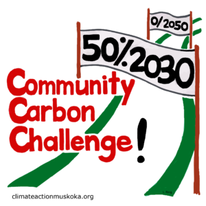
Take the Community Carbon Challenge
from Climate Action Muskoka
Did you know that 80% of your personal carbon footprint falls into the following three areas?
How You Power Your Home How You Travel What You Eat
We recognize that climate change is a global issue and that we must pressure
all levels of government and Banks to invest in a clean, green, just economy.
We know the choices we make in our personal lives DO matter.
Many of us have been acting to reduce our carbon footprint as individuals.
By signing up we become part of the COLLECTIVE community voice speaking together.
Take the Carbon Challenge!
Create YOUR Personal Action Plan!
Reduce your carbon footprint by 8% per year to reach the goal of 50% reduction by 2030.
Go to https://www.climateactionmuskoka.org/
from Climate Action Muskoka
Did you know that 80% of your personal carbon footprint falls into the following three areas?
How You Power Your Home How You Travel What You Eat
We recognize that climate change is a global issue and that we must pressure
all levels of government and Banks to invest in a clean, green, just economy.
We know the choices we make in our personal lives DO matter.
Many of us have been acting to reduce our carbon footprint as individuals.
By signing up we become part of the COLLECTIVE community voice speaking together.
Take the Carbon Challenge!
Create YOUR Personal Action Plan!
Reduce your carbon footprint by 8% per year to reach the goal of 50% reduction by 2030.
Go to https://www.climateactionmuskoka.org/
Join our Facebook page to keep up with issues we feel are important.
If you would like to support the work that EH does,
please consider making a donation.
Draft of Shoreline Bylaw
To see the draft of the County Shoreline Bylaw and accompanying documents go here:
Can we protect those natural shorelines from ongoing decline without undermining
shoreline landowner property rights or the shoreline landscape industry?
To shed some light on this and other questions related to the draft County Shoreline Preservation By-law, we speak with shoreline naturalization expert, Julia Sutton, and environmental planning consultant, Stephen Fahner.
Link to Planet Haliburton podcast, March 30, 2020
Background Resources for this broadcast
shoreline landowner property rights or the shoreline landscape industry?
To shed some light on this and other questions related to the draft County Shoreline Preservation By-law, we speak with shoreline naturalization expert, Julia Sutton, and environmental planning consultant, Stephen Fahner.
Link to Planet Haliburton podcast, March 30, 2020
Background Resources for this broadcast
Climate Change Information and Resources
Enviro-Cafés
EH! hosts EnviroCafés on the Second Tuesday of the month alternating between a Minden and Haliburton location.
Due to the COVID-19 crisis, physical Enviro-Cafés will be on hold until further notice.
Next EnviroCafé
Tuesday June 9 7:30 pm
will be online
using ZOOM
Due to the COVID-19 crisis, physical Enviro-Cafés will be on hold until further notice.
Next EnviroCafé
Tuesday June 9 7:30 pm
will be online
using ZOOM
To register go here.
Special Speakers
EH! invites speakers to address
the AGM as well as a summer event. Recent speakers have included Elizabeth May, Maude Barlow, Norman Yan and
Peter Schliefenbaum.
The 2019 Summer Keynote speaker was
Dr. Dan Longboat
A Way of Life: Indigenous Knowledge
to Sustain the World
the AGM as well as a summer event. Recent speakers have included Elizabeth May, Maude Barlow, Norman Yan and
Peter Schliefenbaum.
The 2019 Summer Keynote speaker was
Dr. Dan Longboat
A Way of Life: Indigenous Knowledge
to Sustain the World
Upcoming Events
Planet Haliburton is a bimonthly program on CANOE FM, our local community radio station, hosted by Terry Moore, Vice president of EH!. Terry covers topics of environmental importance with relevance to the Haliburton Highlands. The program takes an interview format.
Schedule and details here
Schedule and details here

The Ford Fallout: “I’m dreading the day my grandchildren look at me and ask, ‘Why did you let this happen to us?’”
Dianne Saxe, the former environmental commissioner of Ontario, on the dissolution of her office.
BY TORONTO LIFE | DECEMBER 18, 2019
https://torontolife.com/city/the-ford-fallout-environmental-cuts/
After 40 years as an environmental and energy lawyer working all over the province for clients big and small, I gave up everything I had built to become the third (and, alas, last) environmental commissioner of Ontario. My job was to speak truth to power. I was the guardian of the Environmental Bill of Rights and provided all Ontarians with a reliable, independent, non-partisan assessment of the province’s energy, climate and environmental policies.
There is no topic more important, because our home is on fire. My team produced 17 reports, designed and illustrated to make Ontario’s successes, failures and options clear and understandable. People across Ontario relied on those reports, and I criss-crossed the province meeting with hundreds of groups: community associations, farm leaders, real estate brokers, municipal councils, chemists, cabinet ministers and more. Our work inspired and strengthened policies and actions across Ontario, by documenting, for example, the disproportionate pollution of Indigenous communities, the filth poured into our lakes and rivers, and the energy we waste. In 15 languages, including three Indigenous ones, I gave Ontarians the tools to exercise their environmental rights. And, publicly and privately, I coaxed, cajoled, trained and embarrassed the government into fulfilling its own obligations.
“I was always treated with respect, until September 2018, when I delivered a report documenting the destructive effects of the Ford government’s climate actions. Soon afterwards, the province passed special legislation to abolish my office, break the contract all MPPs had unanimously made with me and crush my employees’ union. How did I find out about all this? From the CBC, when a reporter called to ask about my firing.
Twelve of us lost our jobs; several remain unemployed. But Ontario has lost much more. The Ford government has revoked our climate law, cancelled cap and trade and abandoned two-thirds of our climate pollution target. They cut back flood protection. They broke 752 contracts for clean renewable power that we will soon need, cut environmental and energy conservation, allowed endangered species to be killed for a modest price and restricted the ability of municipalities to protect natural areas. They turbocharged urban sprawl, the major driver of Ontario’s climate pollution.
On almost every part of my energy, environment and climate mandate, the Ford government makes claims that contradict the evidence and takes actions that worsen our future. No wonder they wanted to silence me.
The auditor general now can, if she chooses, fulfill part of my old role, and I hope she will. One of her assistants has a title similar to mine, though he has no budget, staff or statutory role of his own, and he does not make himself available to the public. My job was to put the environment first; the auditor general usually evaluates things in terms of money. We’re in a climate and ecological emergency precisely because of the habit of judging everything in terms of money; doing more of that won’t get us out of it.
Ontario was a climate leader until the Ford government was elected. We’ve since become an international embarrassment, and a place where no contract is safe. In 2018, the Nobel Prize for economics was awarded to a Yale professor who showed that carbon pricing is the best and cheapest policy. Yet Ford continues to waste money fighting the federal carbon price, breaking his own promise to drop that attack if Trudeau were re-elected.
Fortunately, my three grandchildren are too young to understand what’s happening, but I’m dreading the day they look me in the eye and ask, ‘Why did you let this happen to us?’ What will I say?”
Dianne Saxe, the former environmental commissioner of Ontario, on the dissolution of her office.
BY TORONTO LIFE | DECEMBER 18, 2019
https://torontolife.com/city/the-ford-fallout-environmental-cuts/
After 40 years as an environmental and energy lawyer working all over the province for clients big and small, I gave up everything I had built to become the third (and, alas, last) environmental commissioner of Ontario. My job was to speak truth to power. I was the guardian of the Environmental Bill of Rights and provided all Ontarians with a reliable, independent, non-partisan assessment of the province’s energy, climate and environmental policies.
There is no topic more important, because our home is on fire. My team produced 17 reports, designed and illustrated to make Ontario’s successes, failures and options clear and understandable. People across Ontario relied on those reports, and I criss-crossed the province meeting with hundreds of groups: community associations, farm leaders, real estate brokers, municipal councils, chemists, cabinet ministers and more. Our work inspired and strengthened policies and actions across Ontario, by documenting, for example, the disproportionate pollution of Indigenous communities, the filth poured into our lakes and rivers, and the energy we waste. In 15 languages, including three Indigenous ones, I gave Ontarians the tools to exercise their environmental rights. And, publicly and privately, I coaxed, cajoled, trained and embarrassed the government into fulfilling its own obligations.
“I was always treated with respect, until September 2018, when I delivered a report documenting the destructive effects of the Ford government’s climate actions. Soon afterwards, the province passed special legislation to abolish my office, break the contract all MPPs had unanimously made with me and crush my employees’ union. How did I find out about all this? From the CBC, when a reporter called to ask about my firing.
Twelve of us lost our jobs; several remain unemployed. But Ontario has lost much more. The Ford government has revoked our climate law, cancelled cap and trade and abandoned two-thirds of our climate pollution target. They cut back flood protection. They broke 752 contracts for clean renewable power that we will soon need, cut environmental and energy conservation, allowed endangered species to be killed for a modest price and restricted the ability of municipalities to protect natural areas. They turbocharged urban sprawl, the major driver of Ontario’s climate pollution.
On almost every part of my energy, environment and climate mandate, the Ford government makes claims that contradict the evidence and takes actions that worsen our future. No wonder they wanted to silence me.
The auditor general now can, if she chooses, fulfill part of my old role, and I hope she will. One of her assistants has a title similar to mine, though he has no budget, staff or statutory role of his own, and he does not make himself available to the public. My job was to put the environment first; the auditor general usually evaluates things in terms of money. We’re in a climate and ecological emergency precisely because of the habit of judging everything in terms of money; doing more of that won’t get us out of it.
Ontario was a climate leader until the Ford government was elected. We’ve since become an international embarrassment, and a place where no contract is safe. In 2018, the Nobel Prize for economics was awarded to a Yale professor who showed that carbon pricing is the best and cheapest policy. Yet Ford continues to waste money fighting the federal carbon price, breaking his own promise to drop that attack if Trudeau were re-elected.
Fortunately, my three grandchildren are too young to understand what’s happening, but I’m dreading the day they look me in the eye and ask, ‘Why did you let this happen to us?’ What will I say?”
Some photos of the ecosystem that the members of Environment Haliburton inhabit
and of the actions and events that we have supported.
and of the actions and events that we have supported.
